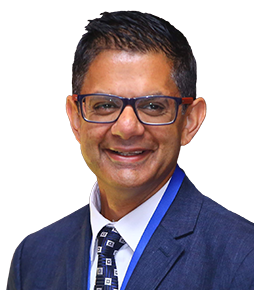


 14:30〜17:15
14:30〜17:15
From the Cradle to the Grave:
The Art and Science of MI Care

Moderator
Prof. REICH, Elmar
University of Cologne
-
Preventing Dentistry “MI” Way!
In his lecture, Prof Banerjee will define the important terminology and principles behind MI – the minimum intervention oral healthcare (MIOC) delivery framework, including its patient-focused, team-delivered, four interlinked clinical domains of disease identification, disease prevention and control, minimally invasive operative interventions and recall/review. He will focus on the primary and secondary prevention & control of caries domain, specifically non-operative and micro-invasive preventive protocols, including biofilm control, remineralisation and sealants. He will describe how all members of the oral healthcare team must be involved in this caries management process throughout the life-course of the patient.
To define minimum intervention oral healthcare (MIOC) as a patient-focused, oral healthcare team-delivered approach to maintaining optimal oral health in all patients To outline the approaches and materials, with scientific and clinical evidence, that can be used to control the dental caries process and prevent carious lesions To discuss the importance of MIOC in the post-pandemic era and the opportunities for training/education of the oral healthcare team members
Minimum Intervention Oral Healthcare,MI,Caries,Prevention,Control,Biofilm Control,Remineralisation
-
GIC and Hybrid Materials & MI in Pediatric Dentistry
Minimal Intervention Oral Healthcare(MIOC)is a philosophy that aims to keep functional teeth for life. Definitely, there is no better strategy to achieve this goal than following-up a child, since the eruption of his/her the first tooth, according to the MI principles.
For many, taking a baby to the dentist might sound unnecessary, but there is already evidence showing that enrolling young children in oral health programs is extremely effective in preventing dentine carious lesions in later stages of life. Therefore, this is presentation will focus on the evidence that supports the development and implementation of preventive oral health programs for babies and to demonstrate, through clinical cases, the applicability of Glass Ionomer Cements and Hybrid Materials in both preventing and managing dental caries in children.To provide an overview of the applicability of the minimal intervention dentistry philosophy to the prevention of dental caries in children To present an oral health program developed for babies and its results in preventing carious lesions Through clinical cases, to demonstrate the applicability of Glass ionomer cements and hybrid materials in both preventing and managing dental caries
Dental Caries,Prevention,Children,Glass Ionomer Cement
-
How Best to Treat Root Caries in the Elderly
Japan has set the laudable goal of 80-20 meaning that at the age of 80, people would have at least 20 of their natural teeth. But to achieve this, dentistry needs to undergo a paradigm shift. Everyone involved, government and dentists particularly must enhance the concept of Minimal Intervention (MI).
Specially in elderly people, preventing and managing root caries is critical to keep their healthy oral condition. This presentation will explain the latest scientific evidence, the best modern materials, the advanced clinical techniques that are combining with MI to make dentistry a key partner in helping patients lead longer healthier lives.Understand how root carious lesions begin and develop Offer the best available clinical techniques and materials to arrest and manage root carious lesions in the elderly Offer the best available clinical techniques and materials to restore root carious lesions in the elderly
Root Caries,Elderly,Carious Management,GIC,CR,Caries Risk,MI
-
MI Restorations in the Aging Dentition
It is acknowledged that populations are ageing and keeping their natural teeth longer, and there is an increasing expectation by patients that they will retain their natural dentition into their senior years. Individualized, minimally invasive restorative management protocols that take into consideration the persons abilities and tolerance, and are less invasive and less costly provide pragmatic and practical outcomes. This presentation will focus on the preservation and restoration of tooth structure and how we can assist our patients to retain, and where necessary, restore their teeth to ensure an ongoing healthy, functional and aesthetic dentition.
Management of root surface caries Minimally invasive techniques for restoring the badly broken down and compromised teeth Maintaining the heavily restored dentition in the older patient
Saliva,Remineralization,Caries,Erosion,Restoration,Glass-Ionomer,Surface Protection,Minimum Intervention
-
Materials and Theory in MI Practices
The materials and their rationale used under the MI practice considering different approaches will be presented, including: remineralization, topical application of fluoride, sealants, infiltration, ART, and MI restorations using adhesive material. The partnership between the health team and patient will be highlighted to ensure that teeth are kept functional for lifetime, acting with maximum prevention in the treatment of oral disease. Diagnosis of oral conditions and patient caries risk should be determined to establish an individualized treatment plan, including guidance on diet, oral hygiene, disease control, the choice of material to be used and the least invasive procedures when necessary.
To make clear that a partnership between the health team and the patient is essential to ensure that teeth are kept functional for lifetime, acting with maximum prevention in the treatment of oral disease Importance of making diagnosis of oral condition and patient's risk of caries, of establishing an individualized treatment plan, including guidance on diet, oral hygiene, disease control, choice of best materials to be used and the least invasive procedures when necessary Execution of the restorative treatment, comprising remineralization, topical application of fluoride, sealants, infiltration, atraumatic restorative treatment, minimally invasive restorations using adhesive material and recall phases
Minimal Intervention Dentistry,Remineralization,Fluoride,Sealants,Infiltration,Calcium-based Strategies,Atraumatic Restorative Treatment,Glass-ionomer Cement









